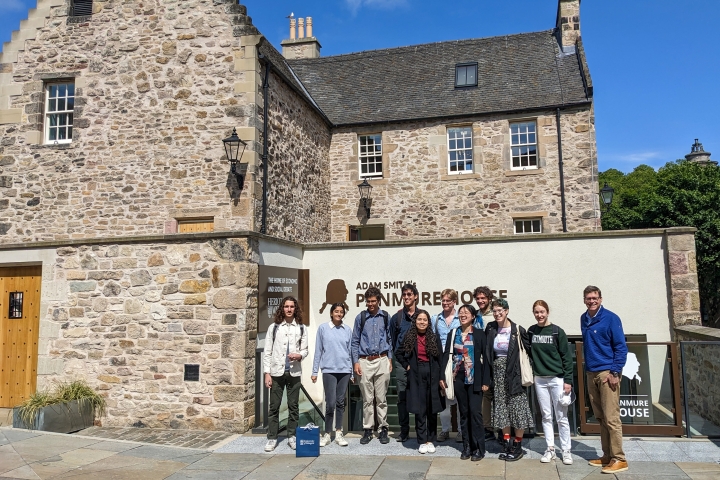A dozen Dartmouth students, along with faculty from economics, philosophy, and history, this month attended Adam Smith Tercentenary Week at the University of Glasgow, marking the 300th year since the birth of the Scottish philosopher considered the father of the study of political economy.
Smith’s tome The Wealth of Nations attacked mercantilism, espoused free trade, and put forward his argument that a “system of natural liberty”—featuring decentralized market interactions—would better serve the public interest than government controls and regulations.
The students on the trip, which was funded by the Political Economy Project, prepared for it by taking part in a PEP-sponsored co-curricular reading group led by Charles Wheelan ’88, senior lecturer and policy fellow at the Nelson A. Rockefeller Center for Public Policy. The students read primary and secondary sources about Smith and the Scottish Enlightenment over the spring term.
Smith scholar Henry Clark, senior lecturer in the Department of Government and the Political Economy Project program director, says that at Glasgow, where Smith was an alumnus and faculty member, the Dartmouth students “showed a level of engagement and serious scholarship that surprised many in attendance. It didn’t surprise us, because we know them, but they made a very good impression.”
Clark says Dartmouth was the only group at the international symposium that invited undergraduates to the week of events, which featured faculty, postdocs, and graduate students from many of the world’s leading institutions and presentations from top thought leaders in economics and political philosophy. They included Gita Gopinath, first deputy managing director of the International Monetary Fund, and Angus Deaton, economics professor at Princeton University and winner of the 2015 Nobel Prize in economics.
Caroline Mahony ’25, who is studying engineering modified by public policy, says it was a “very special experience” to be able to take part in an event with internationally recognized economists and policy leaders and then to get a chance to meet them at receptions and public gatherings.
“I know some of my classmates on the trip were able to go and meet Sir Angus Deaton, and meet his wife,” Mahony says. “The thing about being physically in the same place as these really accomplished people is that you can just go up to them and talk to them, and they’re happy to talk to students. They’re excited to see you.”

Faculty on the trip were Clark; Wheelan; Elisabeth Curtis, senior lecturer in economics; Ian Cruise, lecturer in philosophy and PEP postdoctoral fellow; Darrin McMahon, the Mary Brinsmead Wheelock Professor of History; and Douglas Irwin, the John French Professor of Economics who co-founded the PEP a decade ago.
Clark and Wheelan also presented during a day of academic workshops on June 8, and Irwin was featured on a Smith and Economics panel discussion at the 300 Year Anniversary Symposium on June 10.
Wheelan also led the group on a trip to Edinburgh that included a visit to Panmure House, where Smith lived and worked during the 1780s. There the students presented on themes from Smith’s Wealth of Nations to the Dartmouth students and faculty in a seminar room in the historic house.
“It was an amazing experience,” says Beatriz Da Silva Falco ’25, who is majoring in geography modified by economics. “We saw one of the original editions of Wealth of Nations, and we had a tour where we learned a little bit about his life and his passions. It was very nice to see the place where he worked and what inspired him and to hear about my peers’ ideas in a place that was so full of history.”

